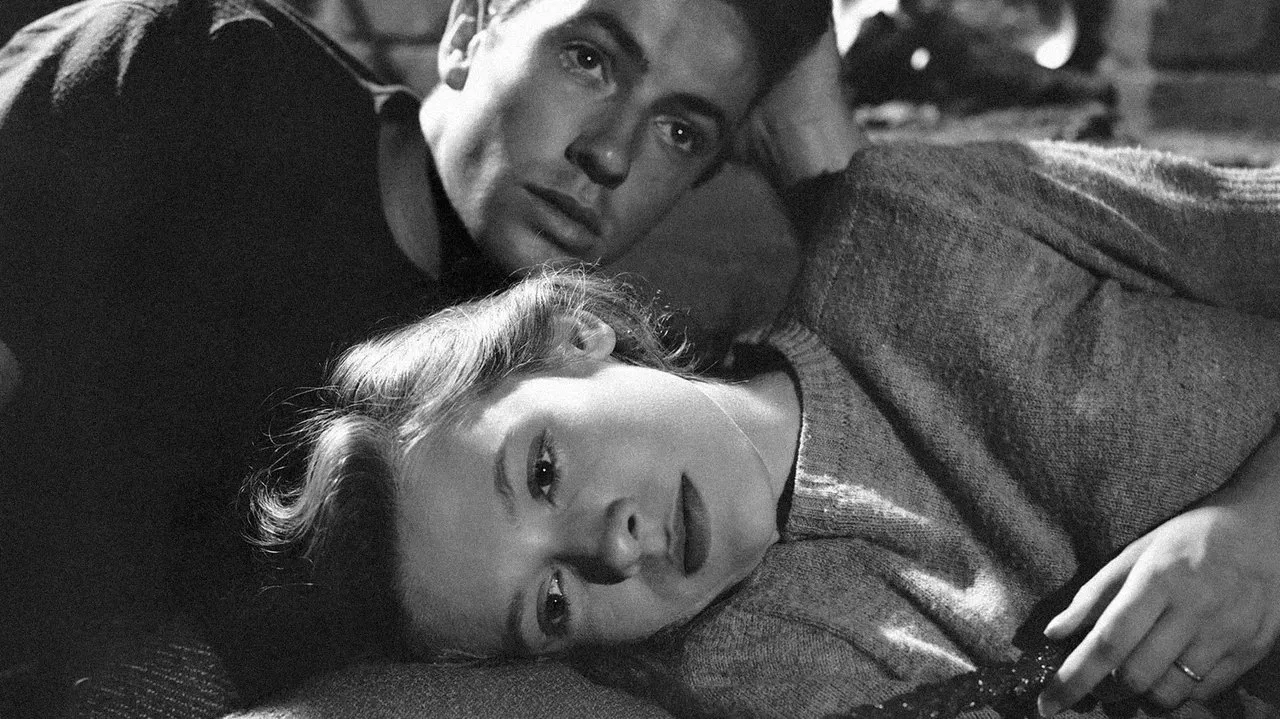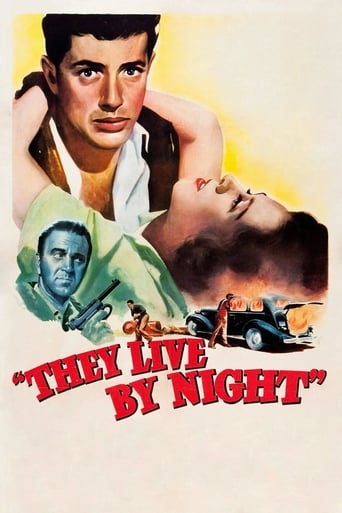

If you're interested in the topic at hand, you should just watch it and judge yourself because the reviews have gone very biased by people that didn't even watch it and just hate (or love) the creator. I liked it, it was well written, narrated, and directed and it was about a topic that interests me.
... View MoreWorth seeing just to witness how winsome it is.
... View MoreIt's easily one of the freshest, sharpest and most enjoyable films of this year.
... View MoreI think this is a new genre that they're all sort of working their way through it and haven't got all the kinks worked out yet but it's a genre that works for me.
... View MoreBowie is a young prisoner escaping from a prison farm with two bank robbers. They are taken in by the Mobleys for a price. Bowie hopes to prove his innocence but must join the others in a bank robbery. He falls for the Mobley daughter, Keechie. After the chaos of the crime, the young love try to start a doomed star-crossed life together.This is a noir of a pair of doomed young lovers. The two leads have an interesting sincerity. They have a youthful innocence but also a world-weariness. They don't come off as movie stars. They seem more real than that. The drama isn't allowed to push too far into melodrama. There is compelling violence and needed consequences. This has a solid noir for its time.
... View MoreIn Nicholas Ray's seminal crime drama They Live by Night, injured bank robber Bowie (Farley Granger) falls for the independent young rancher's daughter Keechie (Cathy O'Donnell), and the two use Bowie's ill-gotten gains to distance themselves from the authorities and the rest of Bowie's gang.Bowie is the gang's wheelman, and when he's injured during a getaway, it's his newfound companion Keechie who gets to nurse him back to health while the others - Chickamaw (Howard da Silva) and T-Dub (Jay C. Flippen) - make themselves scarce. Keechie doesn't think much of her patient and his lifestyle. And make no mistake, Bowie feels little shame in his role, which has included murder. No bright-eyed neophyte, he. But there's something about Keechie, her deliberate movements, her slinky smile, that really appeals to Bowie, and the two slowly fall for each other.The first shot by Ray (in his directorial debut) is an early helicopter angle, as the bad boys speed down a rural road as they escape from jail. In fact, it's the first helicopter action shot, as previous uses of the vehicle were simply to shoot landscapes to set a scene. In any event, a tire is blown and the gang heads toward a farmhouse, where they meet farmer Mobley (Will Wright) and his daughter Keechie. There's chemistry just dripping between Granger and O'Donnell; both seem more naive than they truly are, and although each pretends to dislike the other, it's not long before them old hormones come a-knocking, although not too much, because this is 1948, after all, and the movie's set some 15 years earlier. On the run they go! Ray's first feature is strikingly shot. Aside from that iconic opening helicopter shot, there's also a great little scene of the gang pulling off a job - from Bowie's perspective as the driver. A bystander tries to engage Bowie in conversation just as T-Dub and Chickamaw run out of the building, earning him a rough shove to the face. That's noir film for you. Watch your face! O'Donnell and Granger work very well together (no surprise, since the latter recommended the former for the role), although I think most of the appeal comes from O'Donnell, who turns in a graceful, passionate, and unique performance as the trusting Keechie. Granger, appearing in only his third film (with Rope on the horizon) was never really that good of an actor, and so many of his lines are delivered in an almost nonchalant monotone that you wonder if some lessons weren't in his immediate future. At least no one can accuse him of hamming it up.And do you know who produced this masterpiece? None other than the great John Houseman, who most of us remember from his old Smith-Barney commercials but who was also one of Orson Welles' Mercury Theatre performers back in the day. The man knew talent, and he picked Nicholas Ray to direct without input from the studio. It's to Houseman's credit that the movie's as good as it is - which is to say, a true noir classic. There may not be a Bonnie and Clyde ending, but we're not talking about a Disney finale, either. Bonus cameo - the jeweler who sells Bowie a watch is played by none other than Will Lee. Yes, the same Will Lee who would go on to play Mr. Hooper on Sesame Street.
... View MoreI've been hearing about this film for years though never managed to see it until today when the BBC screened it at 6.10 A.M.! I got up early to check it out and on the whole I don't regret it. From what I'd heard I had assumed erroneously that it was more or less a two-hander for Farley Granger and Cathy O'Donnell when in fact the movie is crammed with familiar faces to serious film buffs none more so than Ian Wolfe (who had to wait for several years before getting another showy role in 12 Angry Men) as an opportunist justice of the peace who performs the ceremony on behalf of O'Connell and Granger, as well as Jay C. Flippen, Howard da Silva, and Will George, not quite eclipsing his role as 'Dad' in The Blue Dahlia. Because I'd only seen Cathy O'Donnell in her goody two-shoes girl next door roles in things like Detective Story I was slightly disconcerted by the early scenes in which she comes on like a semi-tomboy living in a world of men in the sticks and smoking yet, but once - after roughly four reels - she and Granger become a couple she gradually metamorphoses into the guileless girl we know so well. All in all it's a striking debut for Nick Ray and well worth catching.
... View MoreNicholas Ray's first feature film is the prototype for the lovers on the lam genre, generally suggested to foreshadow Arthur Penn's Bonnie and Clyde. I enjoy it for different reasons that for the more contemporary ones. It may not be as intense as those, nor as intense as some of Ray's later efforts such as the unadorned masterpiece In a Lonely Place, but we sympathize on a much purer level with Farley Granger and Cathy O'Donnell's young lovers here than we do with Bonnie and Clyde or the violent lovers of Gun Crazy or much more extreme and shocking variations on that assembly line like Natural Born Killers, Criminal Lovers or Baise Moi. Granger and O'Donnell, two young specimens whose beautiful faces radiate with solemn innocence, find the seeds of love in their first incidental meetings with one another in spite of their cataclysmic circumstances and dangerous dynamics. Indeed, the film is in no small part owing to the argument of heredity vs. environment, which one bears in mind throughout as we not only follow the external plot but also the emotional process of the chemistry between the two leads.Perhaps the movie doesn't take enough chances with Granger's circumstances. He escapes from prison with two hardened down-home bank robbers Chicamaw and T-Dub, but rather than being a part of their underworld economy, though he does find himself planning a heist with them to, in a strange, roundabout way, bring justice to his initial imprisonment, he is fleeing the condemnation of an unjust murder charge. This flaw cannot be argued as a bedrock but if he were a young, budding career thief himself, the audience's sense of morality and justice would be given more vigorous exercise. It would make O'Donnell's love for him ironically more ennobled by not only siding with him against the way the world has treated him, but also by seeing through the way he has treated the world.I was enthralled by the physicality of the two lovers, stressed by Ray in unusual ways. We first see the angelic Cathy O'Donnell in a baggy, oil-stained jumpsuit. She is the daughter of a gas station owner. Her beauty either radiates through the adventitious scuzziness, inherits a raw carnal edge by it, or both. Granger is a swarthy young boy, his anger perpetuated by his submissiveness in his situations, against which he gradually begins to recklessly rebel. Much in the same way we can see Gloria Grahame and Humphrey Bogart baring their most guileless identities, almost too painfully, in the great film Ray made the next year, In a Lonely Place, Granger and O'Donnell are a younger and more socially subversive precursor. Though the story itself may not sizzle with more tension, we feel very deeply for the two lovers based on the sheer presence of their actors.
... View More